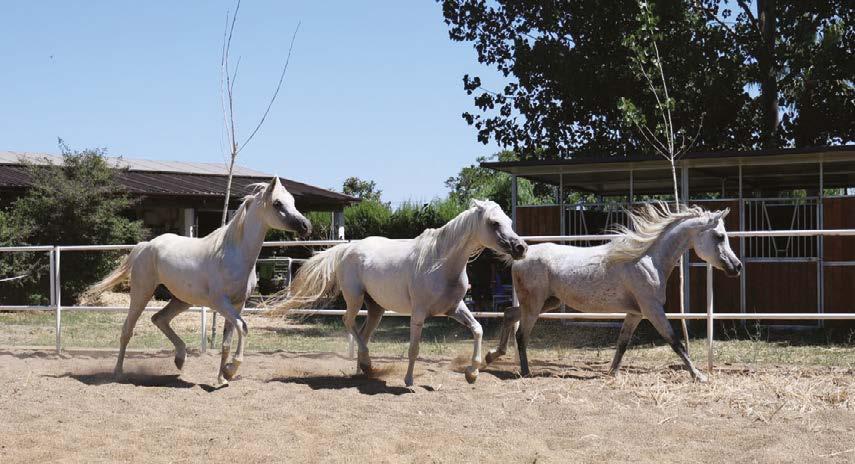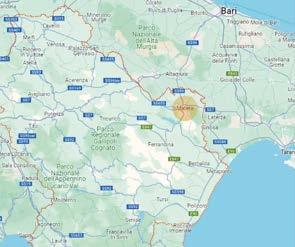
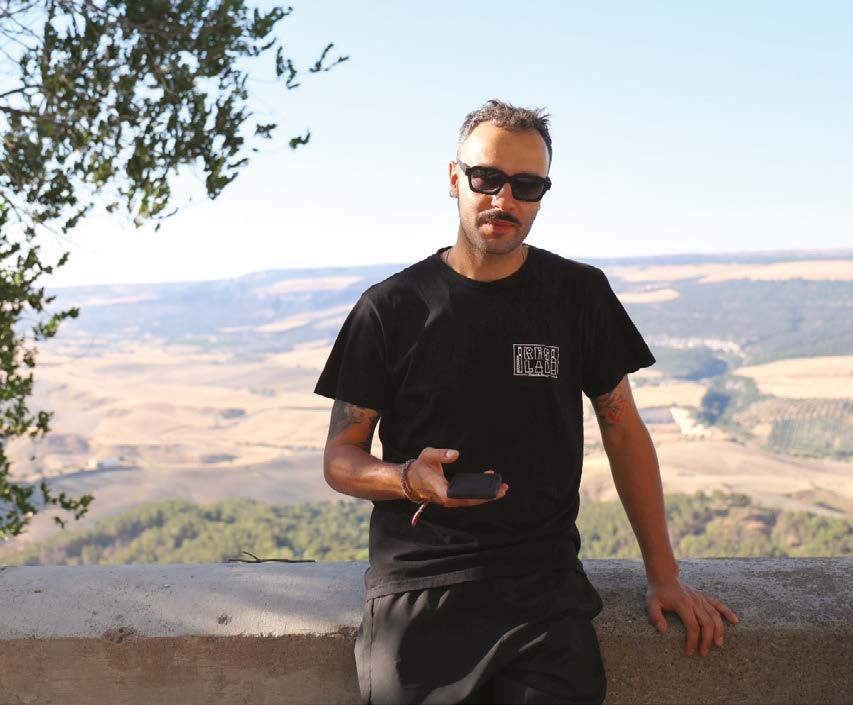
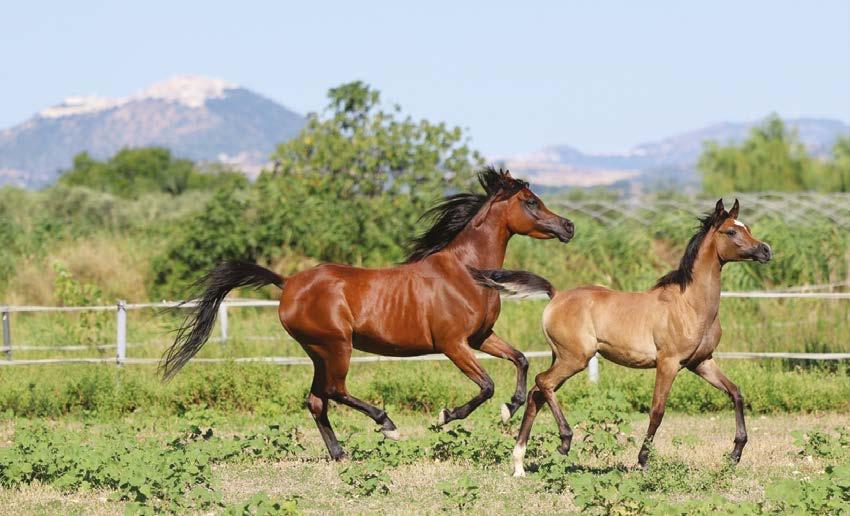




LEONE ARABIAN h OR s E s
Un giovane piccolo allevatore dalle grandi speranze
A young small-scale breeder with big hopes
Text and photos
Monika Savier
“Allevare implica importanti responsabilità, e noi ne sentiamo il peso in ogni accoppiamento cercando di dare valore a un buon pedigree attraverso un buon cavallo”.
“Breeding involves important responsibilities, and we feel the weight of this in every mating,trying to give value to a good pedigree through a good horse.”
Matera è stata dichiarata Patrimonio dell'Umanità dall'UNEsCO per le sue imponenti abitazioni rupestri risalenti al Neolitico, nel 1100 a.C., che sono state abitate fino al XX secolo. La vivace storia della città e dei suoi dintorni è entrata a far parte anche dell'insediamento arabo, che nell'847 d.C. proclamò l'Emirato di Bari nel sud della penisola italiana. Ci sono prove che gli arabi utilizzavano la sicilia e l'Italia meridionale per l'agricoltura e per l'allevamento di cavalli di successo. Tracce di questo si possono ancora trovare oggi nell'archeologia, nella lingua e nella mentalità della popolazione. L'allevamento di cavalli arabi continua a svolgere un ruolo importante nell'Italia meridionale, ma soffre dei collegamenti insufficienti tra il sud e i centri dell'Europa con i loro eventi sportivi, shows e mercati. Ecco perché ho deciso di andare alla ricerca delle gemme nascoste, dell'allevamento di cavalli con cuore e concetto, e di raccontarle.

Matera is a UNEsCO World heritage site for its impressive historical cave architecture dating back to the Neolithic period in 1100 BC, which was inhabited until the 20th century. The lively history of the city and its surroundings also became part of the Arab settlement, which proclaimed the Emirate of Bari in the south of the Italian peninsula in 847 AD. There is evidence that the Arabs used sicily and southern Italy for agriculture and successful horse breeding. To this day, traces of this can be found in the archaeology, language and mentality of the population. Arabian horse breeding continues to play an important role in southern Italy, but it suffers from the poor connections between the south and the centres of Europe with their events, shows and markets.
That’s why I set out to find the hidden gems, the horse breeding with heart and concept, and to report on them. Raffaele Leone invited me to dinner in the old town of
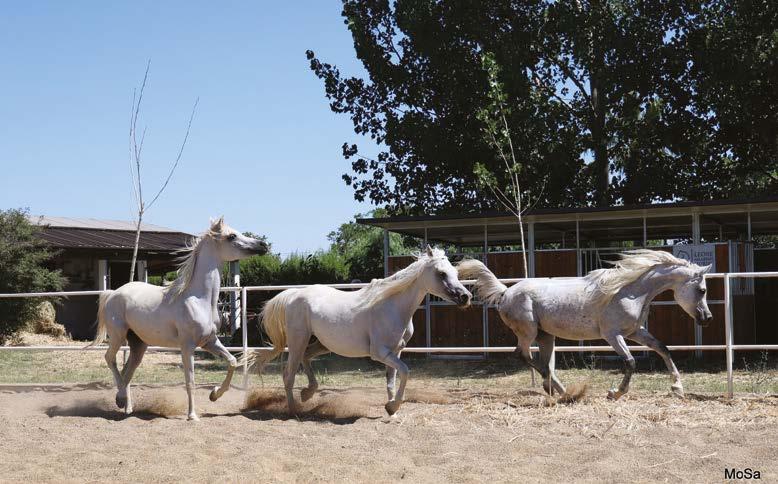
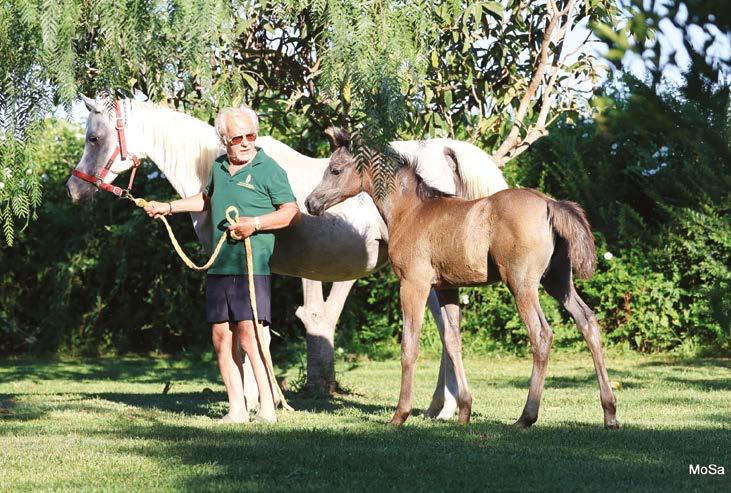
Raffaele Leone mi ha invitato a cena nel centro storico di Montescaglioso, un borgo collinare non lontano da Matera, con cui condivide la sua storia. Il ristorante che gestisce con suo fratello merita sicuramente una visita. La cucina fusion tra tradizione e influenze internazionali era impressionante, così come la DJ giapponese che ha fornito la musica dal vivo. Ma ancora più sorprendente era il birrificio nelle cantine adiacenti. Dopo aver studiato riproduzione e biotecnologia in medicina veterinaria, Raffaele ha lasciato il suo lavoro dopo cinque anni in una clinica nel nord Italia per tornare a casa e allevare lui stesso cavalli arabi. Tuttavia, per garantire il progetto dal punto di vista finanziario, ha seguito una formazione come birraio e ora produce con successo le sue birre.
Il giorno dopo siamo andati a Policoro, sulla costa ionica della Basilicata. Questa rinomata località balneare con le sue lunghe spiagge di sabbia bianca era in piena alta stagione. La scuderia LEONE ARABIANs si trovava a pochi chilometri dalla spiaggia. L'atmosfera era rilassata, tranne che per la comunicazione tra i cavalli. suo padre, medico ed ex sindaco di Policoro, aveva realizzato il sogno del figlio mettendo a disposizione la sua terra per le scuderie e i grandi pascoli per l'allevamento dei cavalli. Quasi 30 cavalli, stalloni, giumente e puledri, alcuni dei quali di grande qualità,

Montescaglioso, a village on the hill not far from Matera, with which it shares its history. The restaurant he runs with his brother is well worth a visit.
The fusion cuisine between tradition and international influence was impressive, as was the female Japanese DJ who provided live music. But even more impressive was the brewery in the adjoining vaults. After studying reproduction and biotechnology in veterinary medicine, Raffaele gave up his job after five years in a clinic in northern Italy to come home and breed Arabian horses
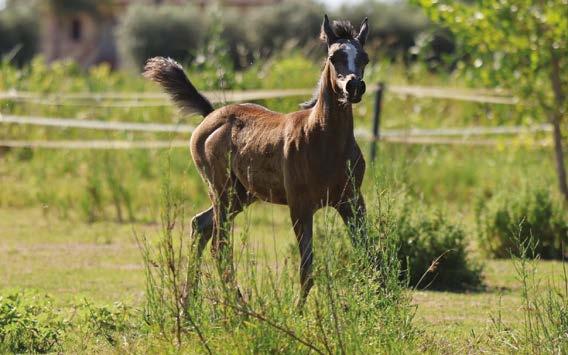
correvano nei paddock e nei pascoli. Tutti avevano grande fiducia in Raffaele e in suo padre, che sosteneva con entusiasmo l'allevamento dietro le quinte. si potrebbe dire che è così che dovrebbe essere l'allevamento di cavalli. Un luogo tranquillo per i cavalli arabi e la loro gente.Il mio consiglio: il sud Italia non è solo affascinante e bellissimo, ma nasconde anche molti tesori, e Leone Arabians è uno di questi. Vale sicuramente la pena visitare l'allevamento.
Cosa ti ha spinto a dedicarti all'allevamento di cavalli arabi?
sono sempre stato appassionato di cavalli, sin da quando dovevo scegliere con cosa giocare da piccolo. Mio nonno, maestro di vita e di cavalli, ha trascorso una vita con gli animali e questa cosa credo di averla nel sangue, mentre a mio padre devo il fondamentale insegnamento di vivere con passione e di passione. Era il 2000, avevo 10 anni, e lui mi regalò il primo cavallo arabo, una splendida puledra russo/polacca proveniente dall’allevamento di Michele Piazzola, K shaga. Questo è stato l’incipit di un amore senza fine. Abbiamo scoperto ciò che per me e la mia famiglia è diventato l’arabo, il cavallo per eccellenza: elegante, sensibile, intelligente e dal cuore grande. Dopo gli anni universitari, la laurea in biotecnologie veterinarie e l’esperienza in una clinica specializzata in riproduzione equina, ho deciso con mio padre di incrementare il lato allevatoriale della nostra passione. Abbiamo avviato la stazione di monta ed abbiamo cominciato ad inserire
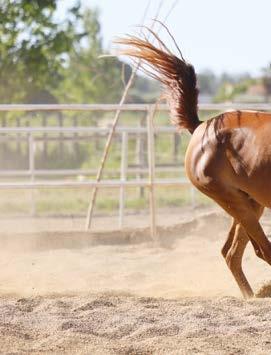
himself. However, in order to secure the project financially, he trained as a beer brewer and now successfully produces his own beers.
The next day, we drove to Policoro on the coast. This well-known seaside resort with its long white sandy beaches was in the middle of the high season. The LEONE ARABIANs stud farm was just a few kilometres from the beach. It was wonderfully peaceful, except for the horses communicating with each other. his father, a doctor and former mayor of Policoro, had made his son’s dream come true by providing his land for the stables and large pastures for breeding horses. Almost 30 horses, stallions, mares and foals, some of them of high quality, ran in the paddocks and pastures. They all had great trust in Raffaele and his father, who enthusiastically supports the stud farm from behind the scenes. This is how horse breeding should be, one might say. A peaceful place for Arabian horses and their people.
My recommendation: southern Italy is not only fascinatingly beautiful, but it also has many hidden gems, and Leone Arabians is one of them. You should definitely visit the stud farm.
What made you decide to breed arabian horses?
I’ve always been passionate about horses, ever since I had to choose what to play with as a child. My grandfather, a master of life and horses, spent his life with animals, and I think I have this in my blood, while I owe my father the
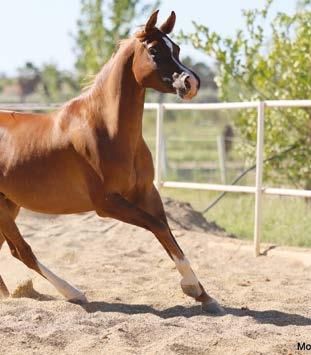
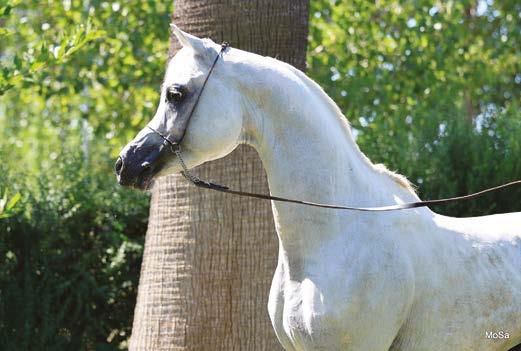
nel nostro programma allevatoriale le linee egiziane, che riteniamo essenziali per creare un buon pool genetico che si esprima nella realizzazione di un cavallo completo. Produciamo dai tre ai sei puledri all’anno destinati al mercato allevatoriale nazionale e internazionale.
Da dove vengono le vostre fattrici base dell'allevamento? e con che criterio le avete selezionate?
La nostra visione è di creare un esemplare dal patrimonio genetico storico proveniente dai paesi arabi di origine, incrociato con linee allevatoriali da show e sport, per ottenere un cavallo arabo che rievochi il passato nell’equilibrio,
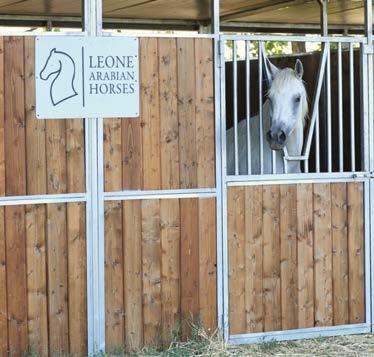
fundamental lesson of living with passion and enthusiasm. It was 2000, I was 10 years old, and he gave me my first Arabian horse, a beautiful Russian/Polish filly from Michele Piazzola’s stud farm, K shaga. This was the beginning of an endless love affair. We discovered what has become, for me and my family, the Arabian horse par excellence: elegant, sensitive, intelligent and big-hearted. After my university years, my degree in veterinary biotechnology and my experience in a clinic specialising in equine reproduction, I decided with my father to increase the breeding side of our passion. We started the stud farm and began to include Egyptian bloodlines in our breeding programme, which
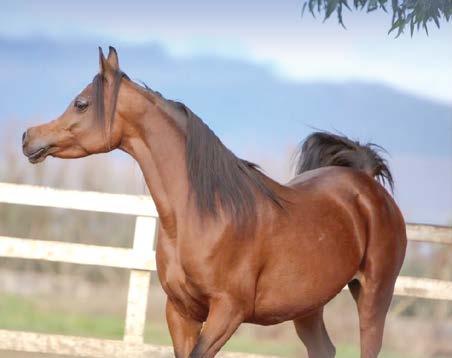
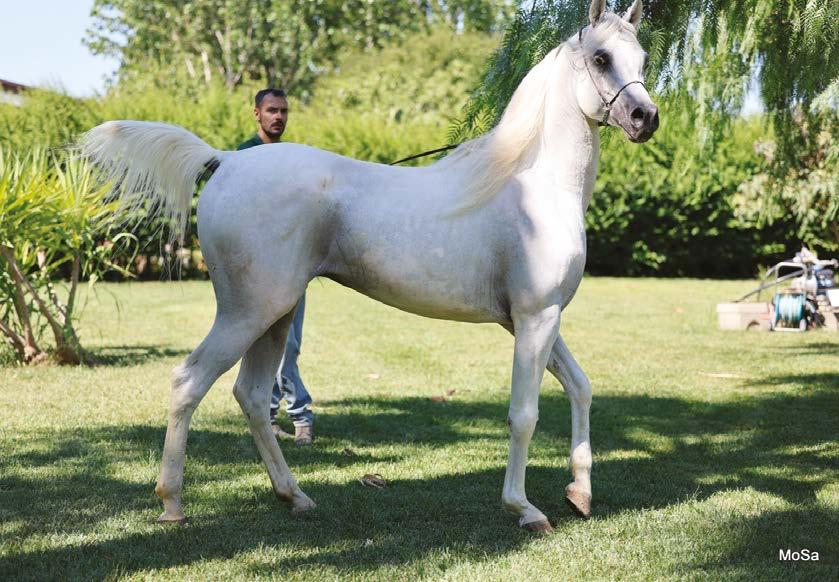
ma guardando al futuro con consapevolezza, con un buon mix genetico senza inbreeding estremo. Attualmente nella nostra scuderia sono presenti fattrici e puledre pure egiziane da Ansata Nile Echo, Kais Al Bayda, True Colors , Kenz Al Baydaa, Naseem al Rashediah, salaa El Dine; ma anche fattrici e puledre da show da Aj Mardan, shangai Ea, Magic Magnifique, Marwan Al Shaqab. Cerchiamo di consolidare e integrare caratteri genetici positivi e necessari al nostro programma, stando ben attenti a non stabilizzare anche difetti strutturali e comportamentali, per dare vita ad un animale corretto e in grado di reggere l’evoluzione del mercato.
Quanto reputi importante la bellezza? e la funzionalità?
Miriamo ad allevare un cavallo riconoscibile ed equilibrato, con arti forti, fronti larghe e grandi occhi, che trova nel movimento leggero e armonico la sua funzionalità e divertimento e, nel rapporto con l’uomo, un insostituibi - Lah

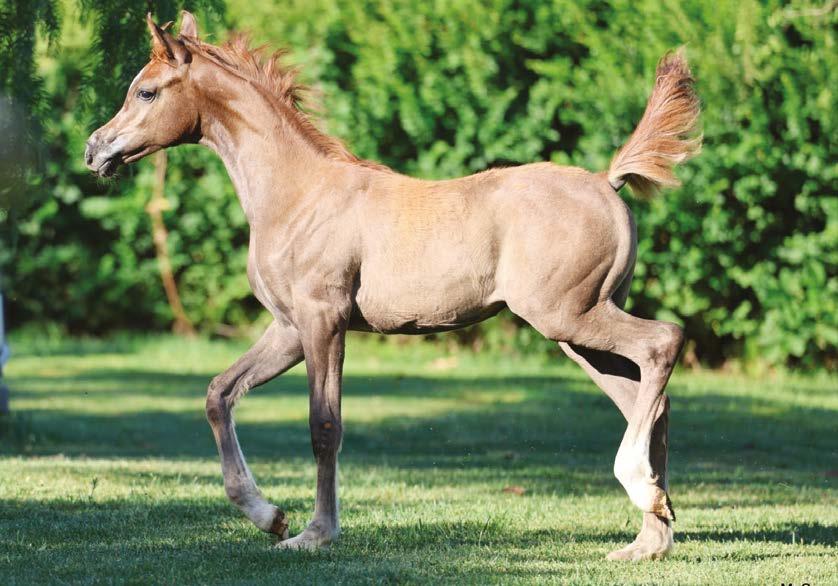
le riferimento. Non necessariamente deve avere un dish estremo, ma i nostri puledri devono complessivamente essere di un buon tipo e possedere un movimento carismatico. Il cavallo arabo, per noi, deve rimanere quell’animale capace di affrontare il deserto e uscirne vincitore.
La riproduzione artificiale è oggi praticata in molti paesi. Cosa ti trattiene dal farlo?
Prestiamo particolare attenzione all’imprinting madre/ figlio e alle tecniche di allevamento naturale senza cadere in forzature tecnologiche della riproduzione che, non tenendo conto di meccanismi genetici indiretti, come l’epigenetica, contribuiscono a dare vita a cavalli problematici e spesso incompatibili con gli equilibri naturali parentali e riproduttivi. Allevare implica importanti responsabilità, e noi ne sentiamo il peso in ogni accoppiamento cercando di dare valore ad un buon pedigree attraverso un buon cavallo, con la consapevolezza che le due cose devono coesistere.
we consider essential for creating a good genetic pool that results in the production of a complete horse. We produce three to six foals per year for the national and international breeding market.
Where do your broodmares come from? and what criteria did you use to select them?
Our vision is to create a specimen with a historical genetic heritage from the Arab countries of origin, crossed with show and sport breeding lines, to obtain an Arabian horse that evokes the past in its balance, but looks to the future with awareness, with a good genetic mix without extreme inbreeding. Currently, our stud farm has pure Egyptian broodmares and fillies from Ansata Nile Echo, Kais Al Bayda, True Colour, Kenz Al Baydaa, Naseem al Rashediah, and salaa El Dine, as well as show broodmares and fillies from Aj Mardan, Shangai Ea, Magic Magnifique, and Marwan Al Shaqab. We try to consolidate and integrate positive genetic traits that are necessary for our programme, taking care not to stabilise
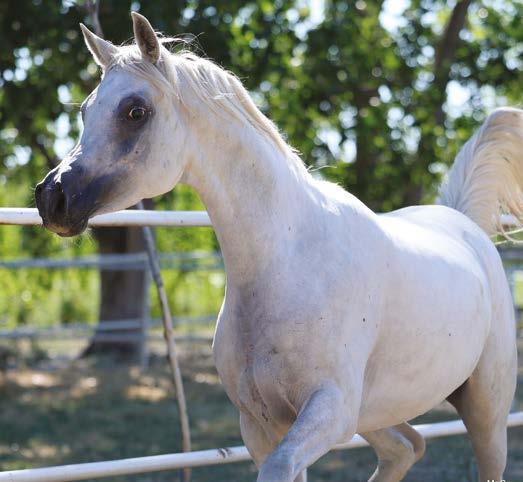
Come vedi il futuro del tuo allevamento nel sud dell' i talia, terra originariamente ideale per l'allevamento dei cavalli arabi?
Credo che Il presente e il futuro del piccolo allevamento italiano siano in piena crisi nonostante esprima competenze e professionalità uniche al mondo, oltre a godere di un habitat perfetto per allevare cavalli sani e sereni, nel sud in particolare grazie alla conformazione geografica e al clima. s e le direttive dell’Associazione nazionale non avranno come obbiettivo principale la tutela dei piccoli allevatori, che con le loro interpretazioni allevatoriali rappresentano il substrato che diversifica in maniera sana questo mondo, ci si ridurrà al proliferare di pochi e grandi allevatori che standardizzeranno il mercato e lo renderanno inaccessibile ai più, esattamente come sta succedendo nel mondo degli show.
Quali misure proponi per migliorare la situazione dei piccoli allevatori?
C’è bisogno di proteggere ed incentivare i piccoli, con premi, applicando le giuste restrizioni per chi viene dall’estero e, inoltre, ridando il giusto valore valore ai puledri nazionali. Vedo questo mondo in profonda
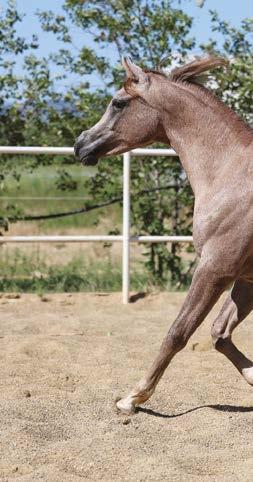
structural and behavioural defects, in order to produce a sound animal that can withstand market developments.
How important do you consider beauty to be? and functionality?
We aim to breed a recognisable and balanced horse, with strong limbs, broad foreheads and large eyes, which finds its functionality and enjoyment in light and harmonious movement and, in its relationship with humans, an irreplaceable reference point. They do not necessarily have to have extreme dish, but our foals must be of good type overall and possess charismatic movement. For us, the Arabian horse must remain an animal capable of facing the desert and emerging victorious.
Artificial reproduction is now practised in many countries. What prevents you from doing so?
We pay particular attention to mother/foal imprinting and natural breeding techniques without resorting to technological reproduction methods which, by not taking into account indirect genetic mechanisms such as epigenetics, contribute to the creation of problematic horses that are often incompatible with natural parental and reproductive balances. Breeding involves important responsibilities, and we feel the weight of this in every
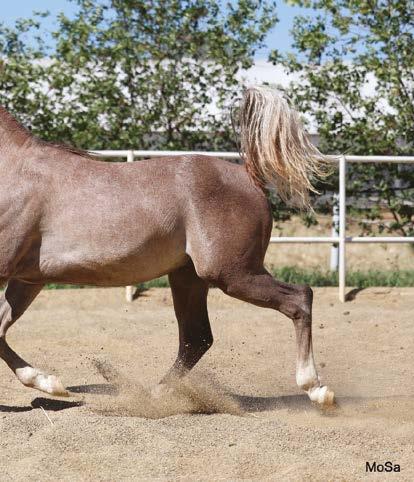
crisi, nelle modalità e negli obiettivi, e se ci si assume le responsabilità di capire che non tutto è all’asta, anche la passione dovrà arrendersi difronte ad un mondo che sta diventando un gioco per pochissimi.
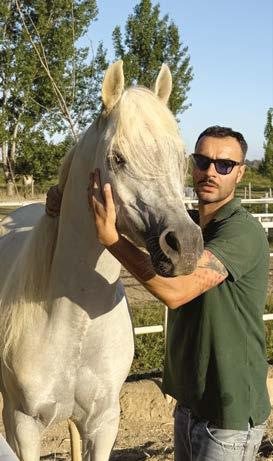
mating, trying to give value to a good pedigree through a good horse, with the awareness that the two must coexist.
How do you see the future of your stud farm in southern italy, a land originally ideal for breeding arabian horses?
I believe that the present and future of small Italian stud farms are in crisis, despite their unique expertise and professionalism, as well as enjoying a perfect habitat for breeding healthy and peaceful horses, particularly in the south thanks to the geographical conformation and climate. If the National Association’s guidelines do not have as their main objective the protection of small breeders, who with their breeding interpretations represent the substrate that diversifies this world in a healthy way, we will be reduced to the proliferation of a few large breeders who will standardise the market and make it inaccessible to most, exactly as is happening in the world of shows.
What measures do you propose to improve the situation of small breeders?
There is a need to protect and incentivise small breeders with awards, applying the right restrictions for those coming from abroad and, moreover, restoring the right value to national foals. I see this world in deep crisis, in its methods and objectives, and if we take responsibility for understanding that not everything is up for auction, even passion will have to surrender to a world that is becoming a game for the very few.
raffaele Leone è un giovane allevatore della provincia di Matera, nella regione meridionale italiana della Basilicata. Dottore in Biotecnologie Mediche e Veterinarie, ha lavorato per 5 anni nella clinica veterinaria e scuderia Equuspa (www.equuspa.it). successivamente ha deciso di tornare nel suo luogo di nascita, Montescaglioso in provincia di Matera. Lì, dopo aver conseguito il diploma di mastro birraio, ha fondato il birrificio con ristorante “R-Esist” (www.birrificioresist.it).
Il suo allevamento “Leone Arabians” ha sede a Policoro, sulla costa ionica della Basilicata. (www.facebook.com/LeoneArabianhorses).
raffaele Leone is a young breeder from the province of Matera, in the southern Italian region of Basilicata. With a degree in Medical and Veterinary Biotechnology, he worked for five years at the Equuspa veterinary clinic and stud farm (www.equuspa).it/. he then decided to return to his birthplace, Montescaglioso in the province of Matera. There, after obtaining his master brewer’s diploma, he founded the brewery and restaurant “R-Esist” (www. birrificioresist.it).
his stud farm, “Leone Arabians”, is based in Policoro, on the Ionian coast of Basilicata (www.facebook.com/LeoneArabianhorses).
